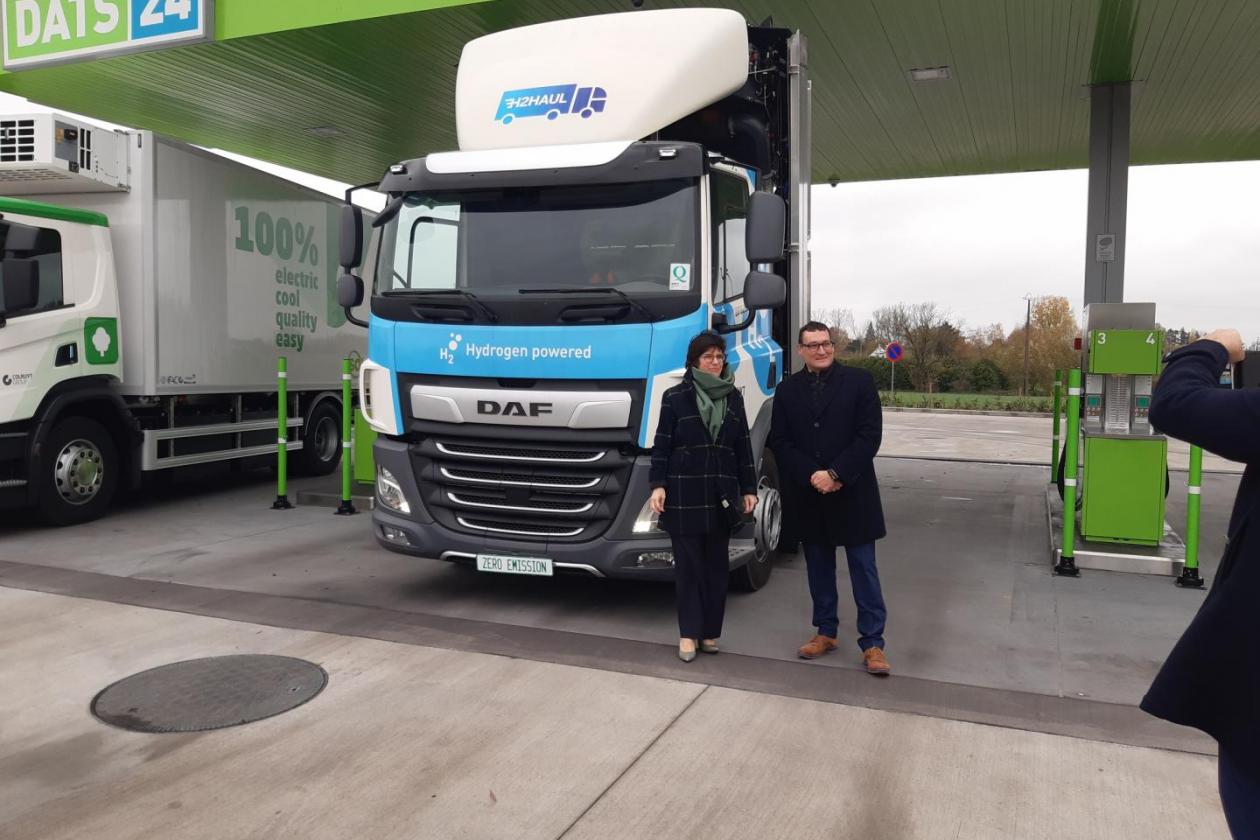Belgian retailer takes next ambitious step in climate impact reduction

22 November, Colruyt Group organised its Zero Emission Transport event in Ollignies. During this event, a new hydrogen refuelling station (HRS) at the distribution centre was opened. Zero-emission vehicles were also displayed, including a hydrogen-powered truck made by VDL. The filling station and truck are part of the H2Haul project, co-funded by the Clean Hydrogen Partnership.
H2Haul hydrogen truck
To further reduce its impact on the climate, Colruyt Group aims to make all its own freight transport emission-free by 2035. But the Belgian retailer also wants to use zero-emission vehicles for transport between shops and distribution centres, which is carried out via suppliers. The company wants to achieve this by using complementary technologies: battery-electric and hydrogen vehicles. Colruyt Group will deploy four VDL trucks (three tractors and one rigid) at one of its distribution centres in Belgium. The trucks will distribute goods between distribution and retail locations. Indeed, freight transport is largely responsible for high CO2 emissions. The driving experience of the H2Haul trucks is like an electric truck, strong, responsive and easy to handle traffic situations in cities and rural areas. Only with the extra range offered by the H2 fuel cell.
With Virya Energy, Colruyt Group has extensive expertise in producing green hydrogen and electricity. DATS 24 builds the electric charging and hydrogen infrastructure in Belgium and Colruyt Group's innovative technical service also plays an important role.
Hydrogen the future?
Hydrogen takes 5 times less space to store and is also much lighter than a battery. New electric vehicles are converted to a hydrogen vehicle by removing some batteries. In their place is an H2 fuel cell. Now H2 trucks have a range of approximately 400 kilometres. If the systen pressure is increased from 350 to 700 bar, 600 kilometres can be achieved.
Green power is plentiful, just often at the wrong time (e.g. solar in summer) or in the wrong place (e.g. offshore wind) and it is difficult to store and transport. Hydrogen can be made anywhere, is easy to store and can be transported through existing gas pipelines. The VDL Groep believes that there is no single path to more sustainable transport, but that a combination of different alternative fuels is essential. In this way, the various alternative fuels complement each other: the disadvantages of one technology are offset by the advantages of the other technology, such as charging time, deployability and infrastructure adaptations.
About H2Haul
A total of 16 vehicles will undergo field tests at sites in Belgium, France, Germany and Switzerland. The innovative hydrogen refuelling stations being installed can refuel H2 vehicles quickly and with large capacity. Partly as a result, the H2 trucks can be shown to be good replacements for diesel vehicles with the same range and loading capacity, but without emissions.
The H2Haul project stands out specifically in the preparation of zero-emission heavy transport. This preparation is split into monitoring the supply of hydrogen to refuelling stations, operating the heavy vehicles in different logistics concepts, organising service and maintenance as the former concepts require different specialisation and safety regulations in their workshops.
The project will run for five years from 2019, with the 16 trucks operating for a minimum of two years. H2Haul has received funding from the Clean Hydrogen Partnership under grant agreement No 826236. This joint venture receives support from the European Union's Horizon 2020 research and innovation programme, Hydrogen Europe and Hydrogen Europe Research.
